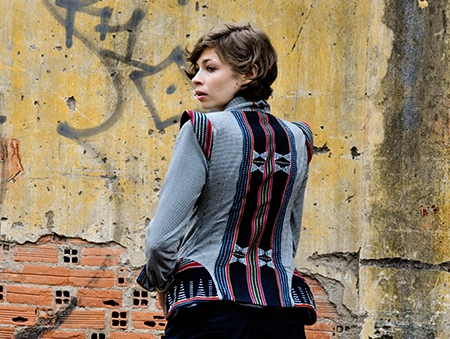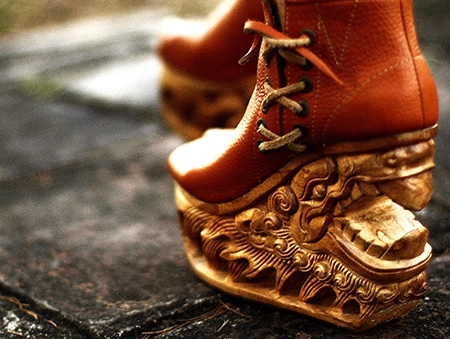Rachael Carson '10
Garment factory workers in many developing nations earn less than 4 percent of the price you’d pay for the average T-shirt. Rachael Carson ’'0 wants to put an end to this exploitation.
She’s doing so with Fashion4Freedom, a company she helped founder LanVy Nguyen establish in Hue, Vietnam in 2011.
“Our ultimate goal is to create opportunities for economic freedom, change the supply chain to end worker mistreatment, and preserve Vietnamese ancestral arts,” said Carson, F4F’s country director. “We’re doing this by supporting entrepreneurship and by helping people secure contracts that provide income enough to avoid low-wage factory jobs.”
So far, F4F has invested in over 45 small businesses and artisan villages. Ten of these are producing F4F’s private clothing and shoe lines, or have contracts to make merchandise for other companies, though all are actively developing.
It’s these private lines – grown out of traditional Vietnamese arts – that endeavor to preserve culture.
Saigon Socialite consists of high-end women’s shoes, complete with hand-stitched leather and intricately hand-carved wooden soles. It’s the soles that reflect tradition, bringing echoes of dragons and other ancestral art to the footwear.
Heritage Weave includes high-end jackets and dresses. They’re made with a unique kind of fabric, woven by ethnic minority women living in a small, extremely remote community on the Vietnam-Laos border.
“These women use a traditional back strap loom that’s affixed to the weaver’s body – the fabrics they make can only be as wide as the spread of the women’s legs,” Carson said. “It’s a very physical process that leads to a lot of back pain, but the fabrics are singularly beautiful.”
“This particular community has no written language, so the fabric depicts culturally significant patterns and images,” she continued. “But being so isolated, the women don’t have access to a market to sell their products, and so have very small profit margins.”
Small profit means many of the women must supplement their income in road construction, an unsafe environment due to the nature of the job and their sometimes predatory male colleagues. Women are also at risk of being sold. Human trafficking, Carson said, is a problem in the area.
F4F is collaborating with the weavers to develop more fabric, and is raising money for more efficient, less physically-demanding wooden looms as well.
“We bring the fabrics to skilled tailors who incorporate them into dresses and jackets in our high-end Heritage Weave Collection,” Carson said. “We’re very conscious of how we use the material since we’re trying to pay homage to the craft.
“We don’t want to degrade the art, we want to elevate it and tell the story of these people. And we want the people to gain safe, reliable income options.”
F4F’s approach to securing economic freedom and ending factory exploitation is also embodied in its Village Sourcing services. The effort connects companies that want to manufacture clothing in Asia with ethical producers whose employees are paid a fair wage and work in safe conditions.
“It’s time for retailers to consider who is producing their products and at what cost,” Carson said. “And after the Bangladesh fire and collapse, they’re finally starting to.”
This particular fire occurred in November 2012 at a textile factory, 112 workers died in the blaze. The New York Times reported that the enterprise was run under appalling conditions. Then, in April 2013, a Bangladesh garment facility collapsed, killing 1,100 people.
Village Sourcing has secured contracts for Vietnamese businesses and artisan villages with the likes of luxury brand Maiyet. Maiyet, whose merchandise retails for thousands of dollars, is a constant presence at all the big Fashion Week events in places like Paris and New York City. Molecule Clothing, an Australian brand, has a similar arrangement with Vietnamese producers for average-price cargo shorts and pants.
All contracts are prioritized for the businesses within F4F’s supply chain, and for those enterprises that have been invested in by F4F’s non-government organization arm, Design Capital Asia.
“It’s an amazing thing, being able to help artisans and small businesses, but also to help large clothing companies learn about ethical manufacturing,” Carson said.
It’s knowledge that she hopes to share in another arena as well – college campuses. F4F has done research with groups at University of the Pacific and Kent State on implementing a program that would get students involved in having their school’s apparel made in responsible ways.
“Uni Lab is about engaging students, perhaps connecting them with a women’s co-operative in Vietnam that can make a college cardigan that would benefit the women with its sales,” Carson explained.
When Carson visited Union in January, she discussed Uni Lab in a “Mind of An Entrepreneur” class. Interest from students was high and she continues to correspond with them about possible projects and ideas.
“We all learn theories in classrooms, like theories of economics, but we need to connect these theories to something practical, something real,” said Carson, who was an organizing theme major in East Asian studies and sociology. “This is an opportunity to do that.”
Carson got her own hands-on experience, and her first introduction to Vietnam, as a Union College Minerva Fellow.
In 2010, she helped the Friends of Hue Foundation implement a project (which eventually became F4F’s NGO arm, Design Capital Asia) that made loans available to small businesses for machinery. She learned so much and saw such great opportunity to foster entrepreneurship – the kind that changes lives and futures – that she’s been in Vietnam ever since.


